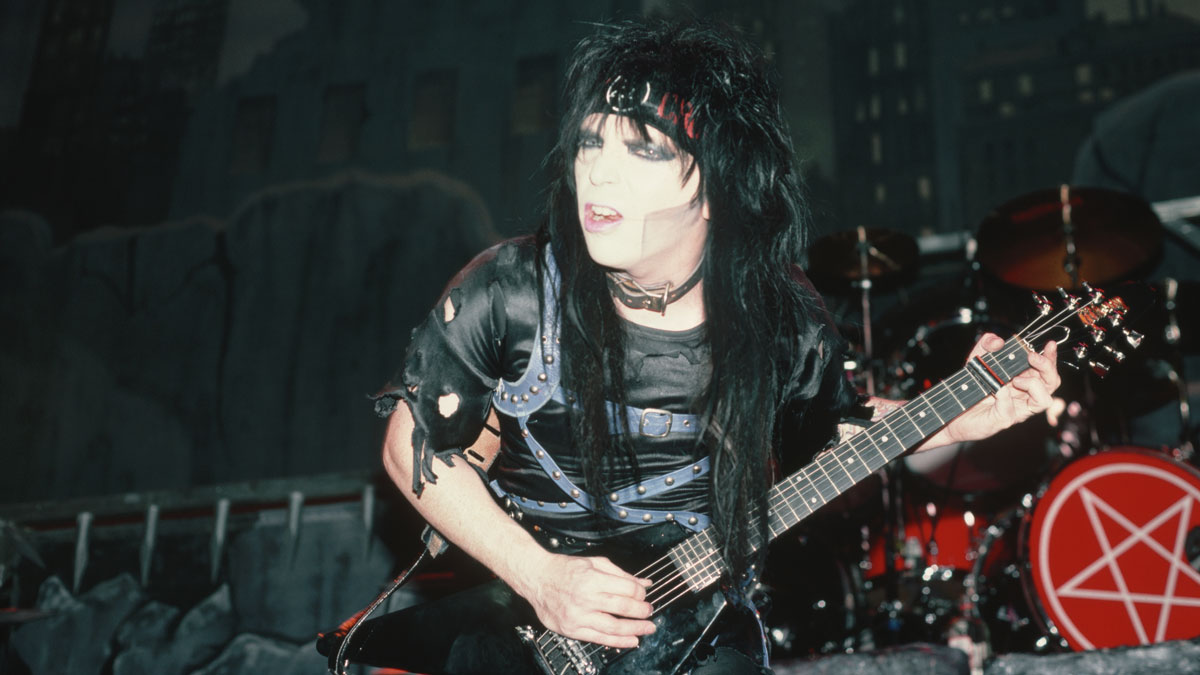Mick Mars' 10 best Mötley Crüe guitar solos
10 times the hair-metal linchpin elevated the band's hard-rock anthems with lead guitar fury

All the latest guitar news, interviews, lessons, reviews, deals and more, direct to your inbox!
You are now subscribed
Your newsletter sign-up was successful
In the land of Mötley Crüe, Mick Mars is gone but not forgotten.
Sure, Mars and his bandmates are sparring in the media – and apparently through the courts – and yeah, John 5 is holding down guitar duties for the band. And while John 5 and his stunning Ghost Tele aren't exactly hard on the ears, there's no denying that seeing Mötley on stage without its veteran six-stringer quietly shredding off to the side is a bit weird.
Moreover, after years away from the studio, Mötley seemed all too eager to climb back on their proverbial hair-metal horse as soon as Mars was out of the way. But regardless of whether the guitarist was holding them back – if he's to be believed, he wasn't – his towering legacy over Mötley's musical history remains.
As an elder statesman, capable songsmith, soloist extraordinaire, and a master of heavy metal riffage, Mars often sidestepped drugs, drama, and generally disparaging comments, always putting his bandmates and the music they created first.
Alas, physical maladies, age, and simply having enough left Mars in a position of not wanting to tour anymore. But, if he's to be believed, he was willing to do one-off gigs and additional studio work. So, what happened? Why was the man that penned and shredded over so many of Mötley Crüe's iconic hits cast by the wayside?
For now, at least, we don't know. And the truth is that perhaps we'll never know. But we do know that throughout his career with Mötley Crüe, Mick Mars has proved himself a master of showstopping guitar playing – as evidenced in our countdown of his 10 greatest solos.
10. Merry-Go-Round (Too Fast for Love, 1981)
Mötley Crüe's debut record, 1981's Too Fast for Love, is the group's rawest overall. But don't tell that to Mick Mars, whose riffs, and solos careen across the median and rumble head-on into oncoming traffic.
All the latest guitar news, interviews, lessons, reviews, deals and more, direct to your inbox!
One of the the best examples of his no-holds-barred approach is Merry-Go-Round, a cut with a plucky riff that seemingly out of nowhere launches into a blistering solo for the ages. At their most seething, Mars' notes reach soaring highs once thought reserved for young Vince Neil's stout vocals.
9. Too Young to Fall in Love (Shout at the Devil, 1983)
At the time of Shout at the Devil's 1983 release, Mick Mars was 32 years of age, nearly a decade (or more) older than his bandmates. And across tracks like Too Young to Fall in Love, Mars' maturity is apparent.
Indeed, his riffs are chunky, but it's Too Young to Fall in Love's short burst of a blistering solo that steals the show here. It's a lightning bolt that simply refuses to be ignored. Mars summons demons to his fingertips, allowing them to howl with fury as he casts his seedy spell unto unsuspecting listeners.
8. Welcome to the Numb (Mötley Crüe, 1994)
If Mars' statements via his recent interviews are to be believed, 1994's Mötley Crüe, aka 'The Corabi Classic,' is the last full album to which Mick lent his licks. And if that's the case, he certainly went out with a bang.
With Corabi – a capable rhythm guitarist and riffsmith – on board, Mars seemed to open up more than ever. The result was some of his finest solos, Exhibit A being the nastier-than-nasty Welcome to the Numb. It's a deep cut, but Mars' tone and phrasing are simply sublime. What's more, it was refreshing to see a forgotten hair-metal six-stringer show the world that he, too, could grunge and grind with the best of 'em.
7. Looks That Kill (Shout at the Devil, 1983)
As one of Mötley Crüe's most well-loved cuts, the appearance of Looks That Kill should surprise no one. As for the song and solo itself, Mars blasts through the track with brain-bending riffage before ripping open the listener's chest and injecting heaping doses of heavy metal magic via his well-worn Strat.
But the best part has to be Mars' pacing, meaning that while others were looking to play faster, Mars dialed it back just a bit, eliciting raw, unladen emotion while choking the song's sonic registers within an inch of their lives.
6. Piece of Your Action (Too Fast for Love, 1981)
Yet another early example of Mars' proto-hair metal mastery, 1981's Piece of Your Action is a simple but scintillating thrill ride. But beyond that, it's quite literally the prototype for all things Mötley Crüe as it pertains to the guitar.
If you listen closely, there are bits and pieces that would ultimately be scattered throughout Mötley's career. And while some would say that means Mars drained his proverbial musical well on Too Fast for Love, a counter to that would be that Mars identified a working blueprint and rode it to unmitigated glory with startling regularity.
5. Same Ol’ Situation (S.O.S.) (Dr. Feelgood, 1989)
As a preeminent cut from Mötley Crüe's most preeminent record, Same Ol' Situation also represents Mick Mars at his glammiest. Sure, to look at Mars, you might liken him to a biker strolling into a dive in the wake of a rainstorm, but don't let his look-what-the-cat-dragged-in persona fool you. No, Mars could priss and preen with the best of them in his heyday, even if he was most of his contemporary's senior by a country mile.
And so, we direct you to the fiery whimsy that is the solo Mars dropped right in the middle of Same O' Situation. If you're into hair metal, this solo has all the things you've come to know and love, which by the way, are things that Mick Mars, at least in some cases, invented.
4. Knock 'Em Dead, Kid (Shout at the Devil, 1983)
Mars' participation in the creation and execution of many hits we've come to know and love has been well documented. But what of the deep cuts? Knock 'Em Dead, Kid is a prime example of all the things that made Mars and his merry band of Mötley cohorts great when they thrust themselves onto the scene. Remember, in '81, hair metal wasn't a 'thing.' But in one fell swoop, all that changed, and Knock' Em Dead, Kid being a prime example.
But of course, it's the solo we're after, and it's a doozy. Just as the second chorus wraps, Mars, seemingly out of nowhere, pinballs into frame with fast-as-lighting but still oh-so-soulful sweeps of six-string wizardry. It's a sight to behold and a harbinger of the hellish antics to come.
3. Dr. Feelgood (Dr. Feelgood, 1989)
Mötley Crüe's hair metal magnum opus, Dr. Feelgood, dropped in '89, serving as a crescendo for the decade of decadence. And while there were big hooks, massive drum fills, and thumping basslines aplenty, it was Mars who found himself in the middle of the action.
With a sleazy vibe and a gargantuan, hard-hitting solo that seems to have been sent from the bowels of hell to detonate and destroy, Dr. Feelgood represents one of Mars' most iconic and belligerent moments.
2. Misunderstood (Mötley Crüe, 1994)
It would seem that Misunderstood is aptly titled as many who have heard it haven't returned. Jokes aside, Mötley Crüe's 1994 self-titled record has amassed a cult following over the years, even if the band all but refuses to play, let alone acknowledge its greatness. We made note of John Corabi's presence earlier. Once again, he was crucial here, as his ability to carry Misunderstood's heavy rhythms allowed Mars to unhinge his inhibitions and unload one of his most emotive and tone-perfect solos ever.
On the one hand, it's a breathtaking listen, but on the other, it's more than a tad bit depressing as it's a shining example of one of the final things Mars would lay to tape for Mötley, if his recent comments are to be believed.
1. Home Sweet Home (Theater of Pain, 1985)
If you've accidentally stumbled upon Sirus XM's Hair Nation, only to not-so-accidentally leave it on for a long road trip (OK, speaking from experience here), you'll know that power ballads were par for the course in the '80s. Yet by the end of the decade, several of them seemed to lack that certain je ne sais quoi that made many of those early sappy anthems so endearing in the first place.
But not to worry, because in the case of Mötley's 1985 power ballad to remember, Home Sweet Home, they brought home the bacon and allowed Mick Mars to fry it up. Of course, we're talking about the slow-burning, then suddenly volcanic solo Mars laid down – with vigor – toward the ending of Theater of Pain's side one closer.
Whatever the future holds for the guitarist, the lasting image of Mick Mars depicts him preparing to launch into Home Sweet Home's solo with a wry smile while looking out and being greeted by row after row of Bic lighters swinging and swaying with each spine-tingling note.
Andrew Daly is an iced-coffee-addicted, oddball Telecaster-playing, alfredo pasta-loving journalist from Long Island, NY, who, in addition to being a contributing writer for Guitar World, scribes for Bass Player, Guitar Player, Guitarist, and MusicRadar. Andrew has interviewed favorites like Ace Frehley, Johnny Marr, Vito Bratta, Bruce Kulick, Joe Perry, Brad Whitford, Tom Morello, Rich Robinson, and Paul Stanley, while his all-time favorite (rhythm player), Keith Richards, continues to elude him.

